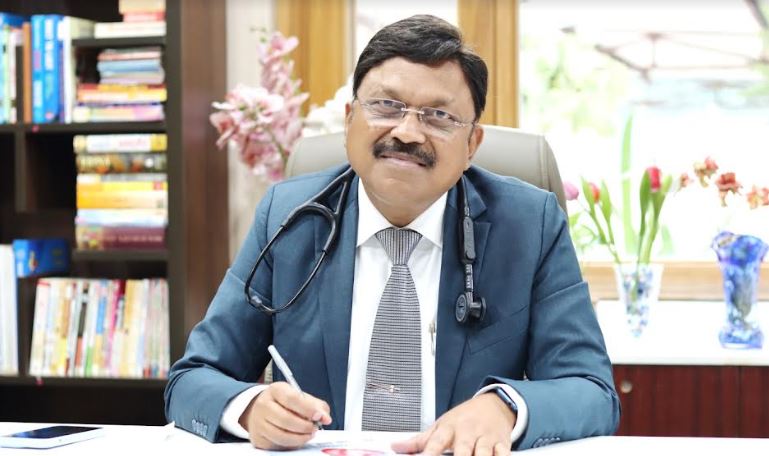Regular exercise tops among other lifestyle factors in keeping the heart healthy

Dr. Bimal Chhajer, Director, SAAOL Heart Centre, New Delhi
In a world increasingly grappling with the repercussions of a global pandemic, it’s easy to forget about another silent killer that continues to claim countless lives every year—heart diseases. The recent data suggests that around 1.2 crore people have been infected globally, with a mortality rate of 5.4 lakh. India accounts for 7.4 lakh cases with a mortality of 20,000 till now. The statistics, when compared to the impact of Coronary Artery Diseases (CAD) and other heart ailments, seem low. On average, around 20 crore people succumb to some form of heart ailment with a mortality rate of 10%, accounting for 2 crore lives lost. India, as the present-day leader in terms of the number of heart disease patients across the world, attributes to a massive 6 crore people being diagnosed every year. As the numbers continue to rise exponentially, an estimated of 9000 per day seem to lose their lives suffering from heart problems, which, in this current scenario, seems to be avoidable.
In the realm of health and well-being, the relationship between exercise and heart health is a topic of paramount importance. Contrary to a popular myth, exercising in the late evening or night is not detrimental to sleep; in fact, it can be a crucial element in promoting a good night’s rest.
One of the most common questions is how much exercise is safe and recommended for the heart. According to the American government’s recommendations, engaging in 150 minutes of moderate exercise per week is ideal. This translates to 30 minutes of exercise for five days a week, allowing for rest on weekends.
Moderate exercise involves finding the right intensity, avoiding excessive heaviness or sprinting, which can strain the heart. This duration is sufficient for gradually improving fitness levels and promoting general well-being.
Certain other natural methods to good heart health are as follows –
Tip 1: Natural Bypass Technique – A Better Alternative
Hospitals in India perform more than 2 lakh open heart surgeries annually, and the number is increasing annually by 25%. However, the cases of heart attacks are not decreasing. This raises a significant question about the use of unnecessary Angioplasties and Bypass surgeries in India and the 10,000 Heart Hospital Industry driven by greedy Heart Surgeons and Interventional Cardiologists. In India, more than 5 lac stents are being put every year, and some 60,000 Bypass surgeries are being done in the heart Hospitals, with 85% of them done on stable heart patients – which can be easily avoided. Present-day Cardiologists are in the wrong track by emphasizing more use of Bypass surgery or Angioplasty, medicines, emergency treatments – but they are overlooking the real cause of heart attack and heart disease.
Tip 2: External Counter Pulsation (ECP) – A Natural Bypass Technique
External Counter Pulsation (ECP), also known as Natural Bypass technique, is an approved mechanical process that dilates blood vessels and enables the body to grow new blood vessels, much like bypass and stem cell therapy. Most patients can walk longer distances and faster, have fewer episodes of chest pain, and require less medication after the therapy. The therapy results in better quality of life, decreased chest pain, shortness of breath, fatigue, tiredness, and a significant improvement in exercise tolerance and energy. Medication is reduced in almost all patients, and advanced tests can confirm the improved cardiac status.
Tip 3: Lifestyle Management is Key
Yoga and Diet-based Lifestyle management, along with Optimum Medical Management, hold the key to preventing heart diseases. These approaches are not only highly effective for maintaining a healthy heart but also for preventing the need for Bypass surgery or Angioplasty. SAAOL (Science and Art of Living) has been treating heart patients successfully for the last 25 years, and its theory is now being proven correct by the most modern medical research. To avoid heart attacks, all patients need is thorough training on lifestyle and the appropriate use of Allopathic medicines.
Tip 4: Zero Oil Cooking – A Heart-Healthy Diet
Zero Oil Cooking is a crucial aspect of heart health. Triglycerides, a form of oil, can form blockages in the coronary arteries, leading to various cardiac ailments. By eliminating oil from our daily diet, we can indirectly protect ourselves from these blockages. Fortunately, there are more than 1000 recipes that don’t require oil and are equally tasty. Nature has packed some fats/triglycerides in every food like rice, wheat, pulses, fruits, and vegetables to meet our basic fat requirements.
Tip 5: Safety Circle – A Comprehensive Approach
The concept of ‘Reversal of heart diseases’ through regular monitoring of heart health via a ‘SAAOL Safety Circle’ can guide every adult in the country to take steps to reverse and prevent heart disease. This technique has benefited over 2 lakh heart patients in the past 24 years with non-invasive treatment modules like lifestyle change, US FDA approved EECP, and a combination of Ayurveda, Homeopathy, Naturopathy, and Detoxification. The SAAOL Safety Circle has three circles and 12 factors to control, with six parameters related to medical and four each related to a healthy diet and lifestyle habits.
The burden of heart diseases on society and individuals is immense, but it is not insurmountable. By adopting these lifestyle tips, we can take proactive steps to prevent heart diseases and promote heart health. It’s time to prioritize our well-being and make the necessary changes to protect our hearts from this silent epidemic that claims millions of lives every year. Remember, a healthy heart leads to a happier and longer life.

